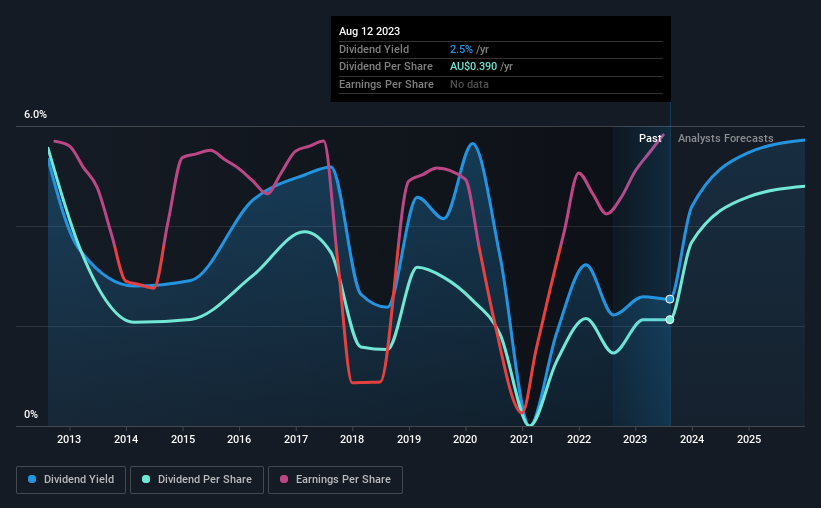QBE Insurance Group (ASX:QBE) Will Pay A Larger Dividend Than Last Year At $0.14
QBE Insurance Group Limited (ASX:QBE) will increase its dividend from last year's comparable payment on the 22nd of September to $0.14. This makes the dividend yield about the same as the industry average at 2.5%.
View our latest analysis for QBE Insurance Group
QBE Insurance Group's Dividend Is Well Covered By Earnings
Solid dividend yields are great, but they only really help us if the payment is sustainable. Based on the last payment, QBE Insurance Group was quite comfortably earning enough to cover the dividend. This means that a large portion of its earnings are being retained to grow the business.
Looking forward, earnings per share is forecast to rise by 47.5% over the next year. If the dividend continues on this path, the payout ratio could be 39% by next year, which we think can be pretty sustainable going forward.
Dividend Volatility
The company has a long dividend track record, but it doesn't look great with cuts in the past. Since 2013, the annual payment back then was $0.662, compared to the most recent full-year payment of $0.253. This works out to be a decline of approximately 9.2% per year over that time. Declining dividends isn't generally what we look for as they can indicate that the company is running into some challenges.
The Dividend Looks Likely To Grow
Given that the track record hasn't been stellar, we really want to see earnings per share growing over time. We are encouraged to see that QBE Insurance Group has grown earnings per share at 26% per year over the past five years. The company doesn't have any problems growing, despite returning a lot of capital to shareholders, which is a very nice combination for a dividend stock to have.
We Really Like QBE Insurance Group's Dividend
Overall, a dividend increase is always good, and we think that QBE Insurance Group is a strong income stock thanks to its track record and growing earnings. Distributions are quite easily covered by earnings, which are also being converted to cash flows. All in all, this checks a lot of the boxes we look for when choosing an income stock.
Investors generally tend to favour companies with a consistent, stable dividend policy as opposed to those operating an irregular one. Meanwhile, despite the importance of dividend payments, they are not the only factors our readers should know when assessing a company. Earnings growth generally bodes well for the future value of company dividend payments. See if the 13 QBE Insurance Group analysts we track are forecasting continued growth with our free report on analyst estimates for the company. If you are a dividend investor, you might also want to look at our curated list of high yield dividend stocks.
Have feedback on this article? Concerned about the content? Get in touch with us directly. Alternatively, email editorial-team (at) simplywallst.com.
This article by Simply Wall St is general in nature. We provide commentary based on historical data and analyst forecasts only using an unbiased methodology and our articles are not intended to be financial advice. It does not constitute a recommendation to buy or sell any stock, and does not take account of your objectives, or your financial situation. We aim to bring you long-term focused analysis driven by fundamental data. Note that our analysis may not factor in the latest price-sensitive company announcements or qualitative material. Simply Wall St has no position in any stocks mentioned.

 Yahoo Finance
Yahoo Finance 
